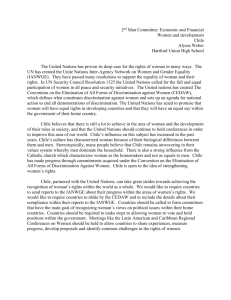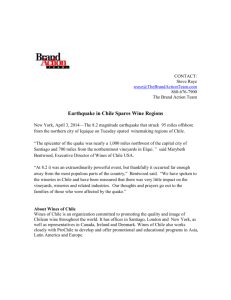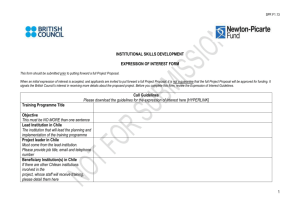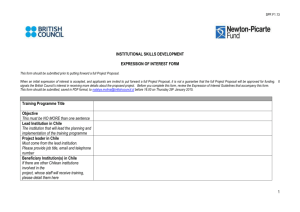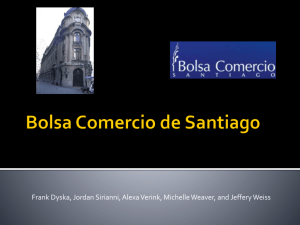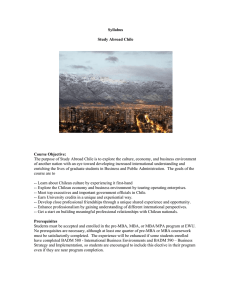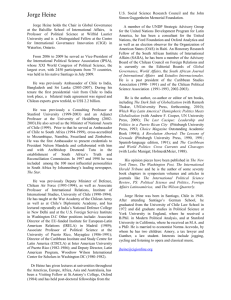CHILE
advertisement
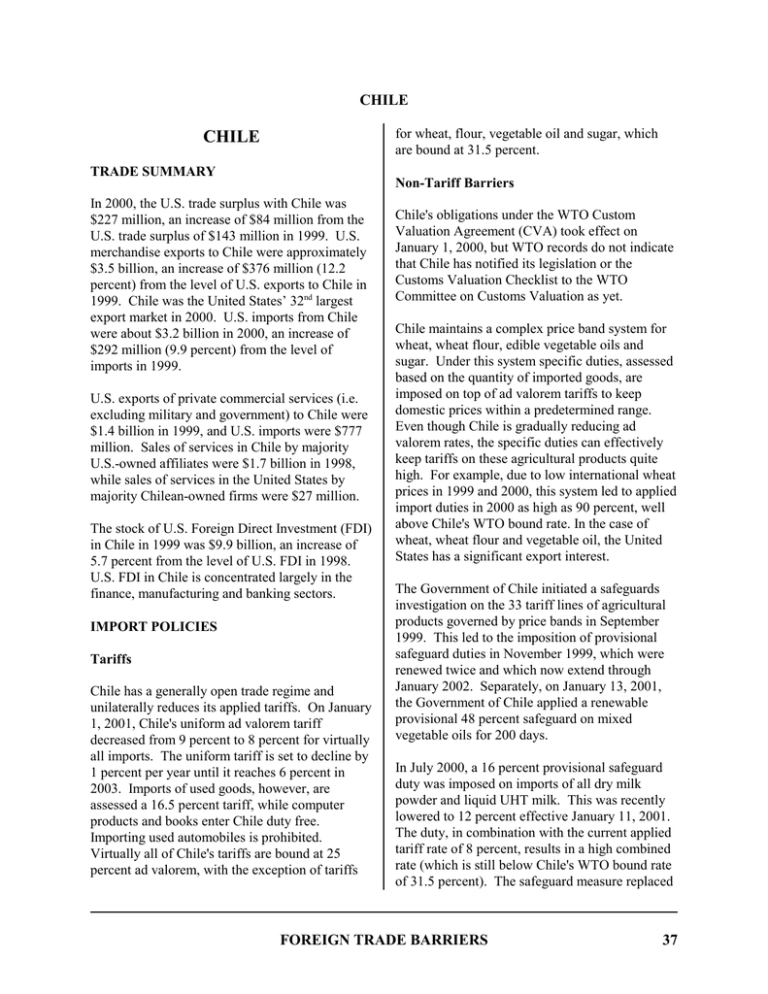
CHILE for wheat, flour, vegetable oil and sugar, which are bound at 31.5 percent. CHILE TRADE SUMMARY Non-Tariff Barriers In 2000, the U.S. trade surplus with Chile was $227 million, an increase of $84 million from the U.S. trade surplus of $143 million in 1999. U.S. merchandise exports to Chile were approximately $3.5 billion, an increase of $376 million (12.2 percent) from the level of U.S. exports to Chile in 1999. Chile was the United States’ 32nd largest export market in 2000. U.S. imports from Chile were about $3.2 billion in 2000, an increase of $292 million (9.9 percent) from the level of imports in 1999. U.S. exports of private commercial services (i.e. excluding military and government) to Chile were $1.4 billion in 1999, and U.S. imports were $777 million. Sales of services in Chile by majority U.S.-owned affiliates were $1.7 billion in 1998, while sales of services in the United States by majority Chilean-owned firms were $27 million. The stock of U.S. Foreign Direct Investment (FDI) in Chile in 1999 was $9.9 billion, an increase of 5.7 percent from the level of U.S. FDI in 1998. U.S. FDI in Chile is concentrated largely in the finance, manufacturing and banking sectors. IMPORT POLICIES Tariffs Chile has a generally open trade regime and unilaterally reduces its applied tariffs. On January 1, 2001, Chile's uniform ad valorem tariff decreased from 9 percent to 8 percent for virtually all imports. The uniform tariff is set to decline by 1 percent per year until it reaches 6 percent in 2003. Imports of used goods, however, are assessed a 16.5 percent tariff, while computer products and books enter Chile duty free. Importing used automobiles is prohibited. Virtually all of Chile's tariffs are bound at 25 percent ad valorem, with the exception of tariffs Chile's obligations under the WTO Custom Valuation Agreement (CVA) took effect on January 1, 2000, but WTO records do not indicate that Chile has notified its legislation or the Customs Valuation Checklist to the WTO Committee on Customs Valuation as yet. Chile maintains a complex price band system for wheat, wheat flour, edible vegetable oils and sugar. Under this system specific duties, assessed based on the quantity of imported goods, are imposed on top of ad valorem tariffs to keep domestic prices within a predetermined range. Even though Chile is gradually reducing ad valorem rates, the specific duties can effectively keep tariffs on these agricultural products quite high. For example, due to low international wheat prices in 1999 and 2000, this system led to applied import duties in 2000 as high as 90 percent, well above Chile's WTO bound rate. In the case of wheat, wheat flour and vegetable oil, the United States has a significant export interest. The Government of Chile initiated a safeguards investigation on the 33 tariff lines of agricultural products governed by price bands in September 1999. This led to the imposition of provisional safeguard duties in November 1999, which were renewed twice and which now extend through January 2002. Separately, on January 13, 2001, the Government of Chile applied a renewable provisional 48 percent safeguard on mixed vegetable oils for 200 days. In July 2000, a 16 percent provisional safeguard duty was imposed on imports of all dry milk powder and liquid UHT milk. This was recently lowered to 12 percent effective January 11, 2001. The duty, in combination with the current applied tariff rate of 8 percent, results in a high combined rate (which is still below Chile's WTO bound rate of 31.5 percent). The safeguard measure replaced FOREIGN TRADE BARRIERS 37 CHILE a 21 percent countervailing duty, which had been imposed in January 2000 on dairy imports from the EU and United States. An extension of the safeguard measure to include cheese is reportedly being considered. STANDARDS, TESTING, LABELING AND CERTIFICATION Chile's strict animal health and phytosanitary requirements prevent the entry of numerous products, such as Northwest cherries and some citrus. As a result of efforts by the U.S. Government on sanitary and phytosanitary issues, however, Chile has begun to open its market to some trade in certain U.S. horticultural products, including citrus, table grapes, kiwis, apples, and pears from the U.S. West Coast. Most recently, in October 2000, Chile published final rules providing market access for avocados and walnuts from California, and has drafted proposed rules, which would allow entry of certain citrus fruits from California and Arizona. However, U.S. exports of fresh and frozen uncooked poultry are effectively blocked from the Chilean market by salmonella inspection requirements. In December 1999, Chile issued an emergency regulation that has restricted all U.S. exports of fertilized salmonid eggs in 2000, despite the disease free status of U.S. salmonid eggs. In 2000, Chile issued draft regulations, which are not based on Organization International des Epizooties’ (OIE) international standards. On February 9, 2001, the United States signed a Letter of Agreement with Chile that will allow U.S. officials to certify U.S. salmonid egg exports as disease free while Chile finalizes its regulation and implements international standards. Only recently have imports been permitted to resume, but under rules which will strongly discourage trade. The U.S. Government is urging changes to these rules. Both poultry and red meat imports from the U.S. are also severely constrained by Chile's failure to recognize the U.S. meat and poultry inspection 38 systems, thus limiting access only to those plants which pay for Chilean inspectors to travel to the U.S. to inspect and certify them. The same rule applies to and constrains U.S. trade in other livestock products, such as dairy and feed ingredients. Further, Chile does not permit U.S. beef in consumer cuts to enter the market without being graded and labeled to Chilean standards, which are incompatible with the U.S. grading and labeling system. According to U.S. and Chilean industry sources, U.S. dry peas exported to Chile are subject to Chilean fumigation requirements, although Canadian dry peas are not. The Chilean government is studying a rule proposed by the Health Ministry to require mandatory labeling of food products containing transgenic ingredients. The United States Government continues to press Chile to implement and enforce WTO-consistent sanitary and phytosanitary requirements. GOVERNMENT PROCUREMENT Government entities in Chile usually do their own procurement. Chilean law calls for public bids for large purchases, although procurement by negotiation is permitted in certain cases. Foreign and local bidders on government tenders must be registered with the Chilean Direccion de Aprovisionamiento del Estado (Bureau of Government Procurement Supplies). They must also post a bank and/or guarantee bond, usually equivalent to 10 percent of the total bid; to assure compliance with specifications and delivery dates. Chile is not a member of the WTO Agreement on Government Procurement. EXPORT SUBSIDIES Chile employs a number of export-promotion measures to help nontraditional exports. ProChile, the Export Promotion Bureau of the Chilean Ministry of Foreign Affairs, promotes and diversifies Chile's exports by providing grants to private companies or industries for export promotional activities, assistance that goes beyond FOREIGN TRADE BARRIERS CHILE what would be considered general export promotion. ProChile efforts are aimed at the promotion of specific products to targeted export markets. It also provides direct financial assistance to the participating firms. Chile provides a simplified duty drawback program for non-traditional exports, which does not rebate actual duties paid on imported components. Instead, the program refunds a percentage of the value of exports. Companies purchasing capital equipment domestically can borrow up to seventythree percent of the amount of customs duties that would have been paid on the capital goods if they had been imported. If the capital goods are ultimately used in the production of exports, the loan balances and any unpaid interest are waived and the producer is not required to repay the loan. Another export-promotion measure lets all exporters defer import duties for up to seven years on imported capital equipment or receive an equivalent subsidy for domestically produced capital goods. Chile has announced that it will phase out the simplified drawback program, in accordance with its WTO commitments. January 1, 2000, when Chile's TRIPS obligations came into effect and still has not been approved by the Chilean Congress. The U.S. Government has urged the Government of Chile to ensure that TRIPS consistent intellectual property protection be provided as soon as possible. The Chilean Congress should address the draft bill soon after reconvening in March 2001. Amendments to the draft law substantially improve protection for undisclosed data, including test data confidentiality. The Chilean patent office still faces a significant backlog of patent applications, although the Government of Chile made some progress in this area in 1999 and 2000. INTELLECTUAL PROPERTY RIGHTS PROTECTION Chile's trademark law is generally consistent with international standards, but contains some deficiencies, including: no requirement of use to maintain trademark protection; a "novelty" requirement for trademark registrations; unclear provision for trademarking figurative marks, color or packaging; and no provisions for protection of "well-known" marks. Some U.S. trademark holders have complained of inadequate enforcement of trademark rights in Chile. Patents and trademarks Copyrights Chile implemented a patent, trademark and industrial design law in 1991 that provides product patent protection for pharmaceuticals and a limited form of pipeline protection. While the law is generally strong, deficiencies exist, including: a term of protection inconsistent with the TRIPS term of 20 years from filing; no provisions for restoring the patent term in appropriate circumstances; inadequate industrialdesign protection; and a lack of full "pipeline" protection for pharmaceutical products patented in other countries prior to the time which product patent protection became available in Chile. The Government of Chile introduced legislation in 1999 intended to make this and other Chilean intellectual property laws fully TRIPS consistent. However, this legislation was not passed prior to Chile revised its copyright law in 1992, extending the term of protection to the author's life plus 50 years, the standard in the WTO TRIPS Agreement. While the copyright law provides protection that is nearly consistent with international standards in most areas, shortcomings remain. The Chilean law does not clearly protect computer software as a "literary work," does not provide clear rental and importation rights, provides inadequate penalties, has no provision for ex parte civil searches, is uncertain regarding the availability of injunctions and temporary restraining orders, and places unnecessary constraints on contractual rights. Despite active enforcement efforts, piracy of computer software and video recordings remains significant. Revision of the 1992 copyright law is FOREIGN TRADE BARRIERS 39 CHILE also addressed in the Government of Chile's 1999 intellectual property rights bill. Chile has not yet ratified the WIPO Treaties on Copyright and Performances and Phonograms. SERVICES BARRIERS Chile's relatively open services trade and investment regime stands in contrast to its relatively limited GATS commitments. In particular, Chile maintains a "horizontal" limitation, applying to all sectors in Chile's GATS schedule, under which authorization for foreign investment in service industries may be contingent on a number of factors, including: employment generation, use of local inputs and competition. This restriction undermines the commercial value and predictability of Chile's GATS commitments. Chile has made WTO commitments on most basic telecommunications services, adopting the WTO reference paper on regulatory commitments and ratifying the GATS Fourth Protocol. Nonetheless, U.S. companies occasionally complain of regulatory delays. During the 1997 WTO financial services negotiations, Chile made commitments in banking services and most securities and other financial services. However, Chile made commitments neither for asset management services, including the management of mutual funds or pension funds, nor for financial information services. Chile also reserved the right to apply economic needs and national interest tests when licensing foreign financial service suppliers. In practice, Chile has allowed foreign banks to establish as branches or subsidiaries and to provide the same range of services that domestic banks are allowed. Providers of securities and asset management services, including pension fund and mutual fund management services, have been allowed to establish 100 percent owned subsidiaries in Chile. 40 INVESTMENT BARRIERS While Chile welcomes foreign investment, controls and restrictions exist. Under a law that regulates foreign direct investment, profits may be repatriated immediately, but none of the original capital may be repatriated for one year. Foreign direct investment is subject to pro forma screening by the Government of Chile. Until mid-1998, all funds entering Chile as ordinary foreign capital were subject to a non-interest-bearing reserve deposit requirement that significantly increased the cost of these capital flows. The deposit requirement, which applied to foreign capital introduced into Chile for most lending purposes, investment in government securities and other socalled, "speculative" purposes, was reduced from 30 percent to 10 percent in June 1998 and to zero two months later. The Government of Chile could reverse this reduction, which was made in response to declining capital inflows stemming from the then-global economic crisis, at any time should it deem such action warranted by financial circumstances. Chile and the United States are negotiating a bilateral tax treaty and hope to agree on a final text in 2001. Until the agreement takes effect, profits of U.S. companies will continue to be subject to taxation by the governments of both nations. Chile notified to the WTO measures inconsistent with its obligations under the WTO Agreement on Trade-Related Investment Measures (TRIMS). These measures deal with local content and trade balancing in the automotive industry. Proper notification allowed developing country WTO Members to maintain such measures for a fiveyear transitional period after entry into force of the WTO. Chile did not meet the January 1, 2000 deadline for eliminating these measures. On December 29, 1999, the GOC requested an extension in its deadline until May 31, 2000. In July 2000, Chile requested and was granted an additional “informal” extension until December 31, 2000, to legislate the end of its TRIMS- FOREIGN TRADE BARRIERS CHILE inconsistent law. The request for an extension was based on the need for more time to fully dismantle the exemption from payment of customs duties envisaged in Article 3 of the Chilean Automotive Statute (Law No. 18.483), thereby bringing the statute fully into line with Chile's commitments under the TRIMS agreement. The United States is working with other WTO Members to effect a case-by-case review of all TRIMS extension requests, with an effort to ensure that the individual needs of those countries that have made requests can be addressed. This process does not limit a Member’s rights under the WTO Agreement. ELECTRONIC COMMERCE There is a growing recognition of the vast potential of electronic commerce in an economy characterized by an export and services orientation. Further, Chile has enjoyed rapid growth in the computer/telecommunications sector and in Internet use. There is evidence of a growing consensus between market participants and policy officials that the regulatory treatment of the industry should promote the sector's competitiveness. While there is an awareness of the myriad of privacy, security, contract law, etc., issues raised by electronic commerce, there is also recognition that the eventual creation of national policies addressing such issues will have to move hand-in-hand with developments internationally. In February 2000, Chile became the first country in Latin America to sign a Joint Statement on Electronic Commerce with the United States, highlighting the countries' agreement that the private sector should take the lead on the establishment of business practices related to electronic commerce. OTHER BARRIERS Distilled Spirit Tax Chile's tax regime historically has imposed higher taxes on distilled spirits imports than on pisco, a spirit manufactured in Chile. The United States has consistently expressed concern regarding the inconsistency of taxes, which burden exports of U.S. vodka, whiskey, gin and other spirits, with the General Agreement on Tariffs and Trade (GATT). In March 1998, the European Union initiated a WTO panel proceeding to review this discriminatory practice. The panel and the WTO Appellate Body found Chile to be in violation of GATT obligations. In January 2000, the Government of Chile pledged to bring its tax regime on distilled spirits into compliance with its WTO obligations. In January 2001 the Chilean Congress approved legislation which will harmonize the ad valorem taxes on imported and domestic distilled spirits. Over a three-year period, taxes on imported distilled spirits will be lowered annually to be harmonized with those on domestic products at 27 percent by March 21, 2003. Luxury Tax Automobile imports are subject to subsequent taxation, in addition to an 8 percent import tariff and an 18 percent value-added tax. A "luxury tax" of 85 percent is levied on CIF value above a certain price level. The Chilean Government raised this price threshold from $10,000 in 1999 to $15,000 in 2000, easing - but not eliminating - the competitive disadvantage placed on higher priced U.S.-made automobiles. A Digital Signature bill was introduced in August 2000 which would give legal status to electronic signatures in Chile. FOREIGN TRADE BARRIERS 41
